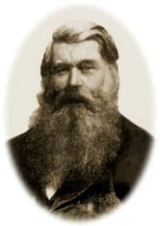
Joseph Swan
Overview
United Kingdom
The United Kingdom of Great Britain and Northern IrelandIn the United Kingdom and Dependencies, other languages have been officially recognised as legitimate autochthonous languages under the European Charter for Regional or Minority Languages...
physicist
Physicist
A physicist is a scientist who studies or practices physics. Physicists study a wide range of physical phenomena in many branches of physics spanning all length scales: from sub-atomic particles of which all ordinary matter is made to the behavior of the material Universe as a whole...
and chemist
Chemist
A chemist is a scientist trained in the study of chemistry. Chemists study the composition of matter and its properties such as density and acidity. Chemists carefully describe the properties they study in terms of quantities, with detail on the level of molecules and their component atoms...
, most famous for the invention of the incandescent light bulb
Incandescent light bulb
The incandescent light bulb, incandescent lamp or incandescent light globe makes light by heating a metal filament wire to a high temperature until it glows. The hot filament is protected from air by a glass bulb that is filled with inert gas or evacuated. In a halogen lamp, a chemical process...
for which he received the first patent in 1878. His house (in Gateshead
Gateshead
Gateshead is a town in Tyne and Wear, England and is the main settlement in the Metropolitan Borough of Gateshead. Historically a part of County Durham, it lies on the southern bank of the River Tyne opposite Newcastle upon Tyne and together they form the urban core of Tyneside...
, England) was the first in the world to be lit by a lightbulb, and the world's first electric-light illumination in a public building was for a lecture by Swan in 1880. In 1881, the Savoy Theatre
Savoy Theatre
The Savoy Theatre is a West End theatre located in the Strand in the City of Westminster, London, England. The theatre opened on 10 October 1881 and was built by Richard D'Oyly Carte on the site of the old Savoy Palace as a showcase for the popular series of comic operas of Gilbert and Sullivan,...
in the City of Westminster
City of Westminster
The City of Westminster is a London borough occupying much of the central area of London, England, including most of the West End. It is located to the west of and adjoining the ancient City of London, directly to the east of the Royal Borough of Kensington and Chelsea, and its southern boundary...
, London was lit by Swan incandescent lightbulbs, which was the first theatre, and the first public building in the world, to be lit entirely by electricity
Electricity
Electricity is a general term encompassing a variety of phenomena resulting from the presence and flow of electric charge. These include many easily recognizable phenomena, such as lightning, static electricity, and the flow of electrical current in an electrical wire...
.
In 1904, Swan was knighted
Knight Bachelor
The rank of Knight Bachelor is a part of the British honours system. It is the most basic rank of a man who has been knighted by the monarch but not as a member of one of the organised Orders of Chivalry...
by King Edward VII, awarded the Royal Society's Hughes Medal
Hughes Medal
The Hughes Medal is awarded by the Royal Society of London "in recognition of an original discovery in the physical sciences, particularly electricity and magnetism or their applications". Named after David E. Hughes, the medal is awarded with a gift of £1000. The medal was first awarded in 1902 to...
, and was made an honorary member of the Pharmaceutical Society
Royal Pharmaceutical Society of Great Britain
The Royal Pharmaceutical Society of Great Britain was formerly the statutory regulatory and professional body for pharmacists and pharmacy technicians in England, Scotland and Wales...
.

